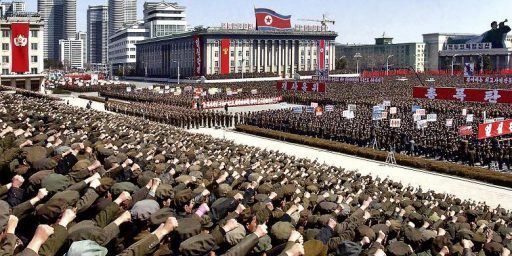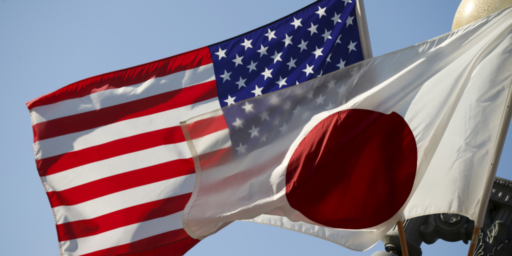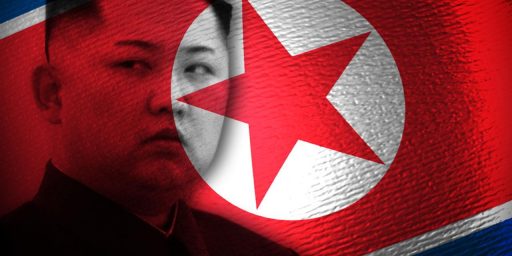Japan And South Korea Also Arguing Over A Bunch Of Rocks
In addition to the conflict between China and Japan over a series of islands in the South China Sea, there’s a also a brewing conflict over another set of what mostly amount to a bunch of rocks between Japan and South Korea:
DOKDO/TAKESHIMA — As they do on any fine-weather day, ferries on Thursday disgorged hundreds of South Korean tourists at these desolate islets. Some charged onto a wharf, waving the national flag and shouting “Daehanminguk manse!” — “Long live the Republic of Korea!” Others unfurled a “Dokdo is our territory” banner and snapped group photographs.
The visitors were part of the flood of tourists who have visited this year — 153,000 and counting — amid a flare-up of long-simmering tensions over the islets, which are administered by South Korea but also claimed byJapan.
There is little for tourists to do here except express their sentiments. The islets are treeless volcanic outcroppings where the wind sometimes blows so strongly that the few residents fortify their windows with duct tape and spend their time dodging bird droppings during the spring migration of gulls. The outcroppings would, in fact, probably be an afterthought if not for the territorial dispute, which centers as much on Japan and South Korea’s fraught history as it does on claims of the rich fisheries nearby.
The territorial debate over the islets, known as Dokdo in South Korea and Takeshima in Japan, is one of several simmering in Asia that some analysts fear could lead to hostilities, many of them tied to China’s rise and its increasingly assertive claims to territory in the South China Sea. But experts say the increasingly shrill disputes between Japan and its East Asian neighbors, including China and South Korea, are potentially more explosive because the animosity is rooted in good part in anger over Japan’s brutal dominance of both countries decades ago rather than solely in a fight for natural resources.
On Dokdo/Takeshima, such anger is palpable.
Kim Seong-do, one of only two South Koreans who live here but do not work for the government — the other is his wife — is perhaps more animated than most on the subject, but strong feelings over the islets are widespread.
“If the Japanese come to take this place by force,” said Mr. Kim, 73, “I say ‘Give me a rifle.’ ”
South Korea’s leaders have generally tried to keep quiet about the islets, assuming that any discussion would play into Japan’s hands. But in recent years, the government has been more aggressive in staking its claim.
In August, President Lee Myung-bak became the first South Korean president to visit. That trip — and his subsequent suggestion that the Japanese emperor did not need to travel to South Korea unless he apologized unequivocally for Japan’s colonial rule of the Korean Peninsula — set off an unusually strong reaction in Japan, where a weak government has been pushed by a small but vocal group of nationalists to take a stronger stand on territorial disputes.
Last month, the South Korean government opened a small Dokdo museum in Seoul that displays documents and ancient maps that the government says uphold its claims to the islets.
The South Korean government continued its public relations campaign on Thursday, agreeing to fly reporters for Western publications to the islets and allowing rare access to the armed police officers who guard against intrusions by Japan.
The government PowerPoint presentation included a well-known song in South Korea that says in part, “Hi, Dokdo, did you sleep well last night?”
The nationalistic sniping between two of Washington’s crucial allies over these specks of land serves as a reminder of the trouble that the United States faces as it tries to “pivot” back to Asia. The standoff contributed to South Korea’s decision to back out of an agreement, supported by the United States, to share military intelligence with Japan.
Some historians and security analysts say Washington is partly responsible for the troubles.
Japan says it reconfirmed its sovereignty over the islets in 1905 when it incorporated them into one of its prefectures. But South Korea sees that move as part of Japan’s forced annexation of the Korean Peninsula, which was completed in 1910.
While leading the negotiations to redefine Japan’s territory after World War II, Washington did not clarify who owned the islets. After the so-called San Francisco Treaty, which set the terms of Japan’s surrender, went into force in 1952, South Korea declared the islets as its own, and since 1954 it has kept a police contingent there.
The dispute with China is also rooted in resentments over Japan’s days as a conquering empire in the early and mid 20th Century, as well as a reminder that historical memory remains a powerful force






The dispute over Dodko has been ongoing for some years and is a frequent topic at a blog where I contribute though personally I’ve never written on the subject.
South Korea’s President visited the islets just a little over a month ago.
Greetings:
Since the analog-to-digital TV signal conversion, I’ve been watching a fair amount of the Korean Broadcasting System’s “KBS World” programming and I would offer this.
World War II in Asia is not the almost dead issue it is in this country. While our media and TV programmers rarely think of it except for the Atomic Bathos Bath every August when those cute Hiroshima and Nagasaki grannies are trotted out for their annual weep and wail, the Chinese and Koreans have a much different take on all that history.
Having experienced the joy of Tojo’s and Hirohito’s Great 20th Century Adventure up close and personal, the Chinese and Korean media produce any number of films and serial drams about the occupation and destruction that was suffered by their countries and their people. As Queen Elizabeth might intone, “They are not amused”.
While those islands can be described by one as “a bunch of rocks”, the emotions involved are probably not ones that today’s post-modern progressive can actually feel and, somewhat worse, are subject to demagogic manipulation. While we certainly don’t know what the Chinese Communists or the South Koreans real intentions are, a feeding frenzy over a “bunch of rocks” is certainly another straw on the Obama Administration’s foreign policy camel’s back.
They’re not just aruging over a bunch of rocks. They’re arguing over a bunch of rocks with hundreds of millions of dollars of natural gas under them.
@Stormy Dragon: What’s going to be really cute is what happens when due to global warming these specks of land go back down under the water…..poof no more territorial claims?
Our concepts of property haven’t really caught up with reality.